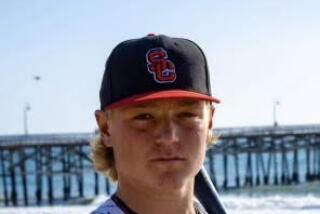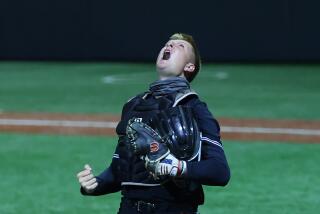A 96-m.p.h. Fastball, and That’s Not All! : Scouts Missed Half of the Show: Young Webb High Hurler Can Hit One a Mile
- Share via
It was an early-season winter league game and the scouts had gathered behind the backstop to watch a promising young pitcher--and hitter--from Webb High in Claremont who was playing for the Cincinnati Reds scout team.
After charting him with a radar gun for one inning, the scouts had seen enough to tell that Scott Singelyn was no ordinary high school pitcher and left en masse.
Singelyn remembers one of his friends asking a scout why he was leaving so soon, before seeing Singelyn bat.
“We don’t care how this guy hits,” the scout said. “He’s throwing 92 miles per hour.”
That wasn’t even Singelyn’s best stuff.
Clocked at 96
Singelyn, whose fastball averages in the mid-to-upper 80s, has been clocked at 96 miles per hour.
Not bad for a 17-year-old who is still maturing physically.
“People say Scott’s the best 17-year-old they’ve ever seen,” said Webb assistant coach Steve Shepard. He said he is certainly the best Webb has ever seen.
“When he’s on, he can beat anyone,” Shepard said. “He’s just quite a kid.”
“When he is rested and on, he can be overpowering,” Coach Rick Whyte said. “He just throws the ball by you. I’ve coached a lot of American Legion and I’ve coached a lot of good players who have gone on to the pro baseball, and I have never seen a kid with his ability.”
Shepard said the 6-3, 190-pound Singelyn is the foremost reason why Webb has been transformed from a run-of-the-mill team into a CIF Southern Section 1-A Division power. With him leading the way, Webb has a 14-4 record and is ranked No. 10 in the division.
50 Innings, 80 Strikeouts
“In three years since he has been playing for us, we’ve made the playoffs,” Shepard said. “I think that says enough.”
The praise is understandable. In 50 innings this season innings he has a 6-1 record, an 0.75 earned-run average, 80 strikeouts, two no-hitters and a one-hitter. He has allowed only 16 hits.
And then there’s his hitting: a .617 batting average with 14 extra-base hits in 47 at bats, 3 home runs and 28 runs batted in. He also is a solid defensive player who has played first base, shortstop and third.
Singelyn’s high school baseball career started at California High, a 3-A Division school in his hometown of Whittier, where he played as a freshman.
But Singelyn did not like California High and transferred to academics-rich Webb, a private school, with older brother Eric before his sophomore year.
He entered Webb as a catcher but it did not take long for Webb’s coaches to switch his position.
“We took one look at his arm and decided to convert him,” Shepard said.
Singelyn had greater impact as a hitter as a sophomore, batting .500 to help the Gauls reach the CIF Small School Division semifinals. As a junior he batted .550 and posted an 11-1 pitching record with an 0.70 earned-run average and 115 strikeouts.
Although Whyte says he may be in the minority, he thinks Singelyn is an even better hitter than he is a pticher.
“Most people are looking at him as a pitcher, but I’m looking at him as a hitter. He has got such a good eye and very good wrists. The one thing he does so well is hit the ball where it’s pitched. That’s very unusual in high school, especially with a power hitter. Most high school hitters pull everything.”
But it is Singelyn’s pitching that has drawn more raves.
That is probably the biggest reason why Singelyn was recruited by most of the top NCAA Division I colleges on the West Coast and signed with Pepperdine. It is also why he is considered a high choice in the major-league free-agent draft in June--possibly as high as the fifth round.
Singelyn said his control has improved since last season and has made him more effective.
“My fastball has always come at high speed, but the control hasn’t always been there. Last year I was just a high school kid with a good arm. This year I use my whole body and you can see what the ball does. It sails. It jumps.”
It even brings havoc to Webb’s catchers, who have had problems holding his fastballs. “We don’t really have a catcher who can hold on to his pitches,” Whyte said. “It can be very hard to handle.”
Singelyn said he needs to improve his strength and condition. In later innings of games, when his fastball is weakening, he has relied on a good curve ball.
“In the later innings I tend to rely on my finesse. I’ll bring the fastball in and out and come in with the curve. I try to rely more on placement.
“I’ll get stronger. I don’t think I’m there yet, but I’m capable of throwing consistently in the 90s, and the college ball will help a lot.”
Whyte says that with hard work--and better work habits--Singelyn can develop into a star at the college and pro levels.
“He still needs to get himself in a little better shape,” Whyte said. “Deep down inside he has to realize that if he wants to be a good pro ballplayer he is going to have to work at it. He has to know that he can’t do it on talent alone.”
Singelyn says he has felt a lot better physically since he started running and swimming on a regular basis. One of his friends at school, Jesus Calderoni, hasn’t given him much choice.
Calderoni wakes Singelyn at 6 a.m. every day to run about three miles with him, and Singelyn follows that by swimming 15 laps in the school pool.
“It has made a big difference,” Singelyn said. “I didn’t do it before and I feel a lot better. Every kid who has some talent thinks they have it all and then their arm gets sore and they can’t pitch.”
Singelyn says his grades (he has a C average) have not been as good as he would like but that it has a lot to do with stringent academic requirements at Webb, where he has taken mostly college prep courses.
“I went to public school as a freshman and had a 3.0 (grade-point average), and when I went here it was only a 2.0. But they stuck with it because they liked me and I’m a good athlete. The one thing about this school is it prepares you for college. I might have a 2.0 here but it could be 3.0 in college.”
The question is, with Singelyn’s status as a major-league prospect, will he make it to Pepperdine next year?
“I really want to go to college. That’s my main goal. But my parents say if I get offered enough money then I should turn pro. But I want to go to college. I’m about 99% certain that I’ll go to college.”
Of course, Singelyn says, with the right financial offer he could change his mind.
More to Read
Get our high school sports newsletter
Prep Rally is devoted to the SoCal high school sports experience, bringing you scores, stories and a behind-the-scenes look at what makes prep sports so popular.
You may occasionally receive promotional content from the Los Angeles Times.






